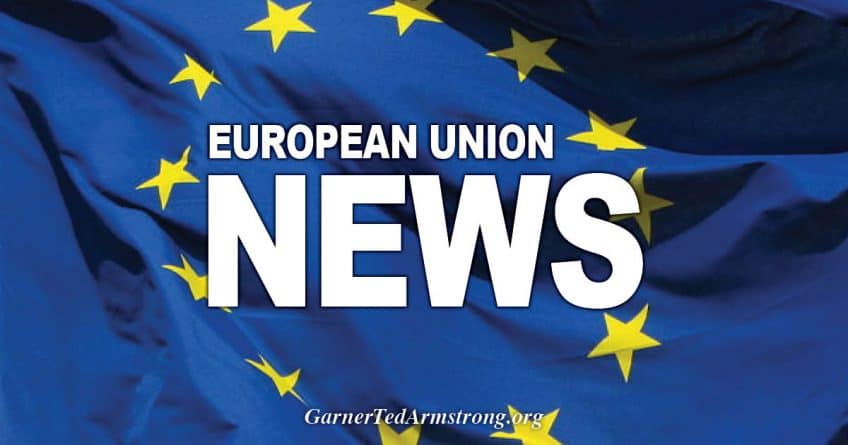
British lawmakers, who meet in the Palace of Westminster in London, are trying to determine what sort of Brexit they want. (Adrian Dennis/AFP/Getty Images)
LONDON — Prime Minister Theresa May told fellow Conservative Party lawmakers on Wednesday that she was prepared to resign before the next round of Brexit negotiations with the European Union, offering up her leadership post in an effort to persuade hard-liners to support her unpopular plan to exit the bloc.
May’s offer to curtail her political career to save her vision for Brexit was a desperate gambit. Whether it will be enough to pass her withdrawal plan was not clear.
What was obvious was that Parliament still does not know its own mind on Brexit.
In a special late-night session of “indicative votes,” an effort to find new ways to break the impasse, the House of Commons could not produce a majority for any of eight Brexit proposals put forth by members.
The closest vote was for a “soft” Brexit based on a new customs union with the E.U. It lost by eight. A call to stage a second Brexit referendum was defeated by 27 votes.
On a day when Parliament thought it would take control of Brexit, May and her deal still dominated.
Brexit Secretary Stephen Barclay told the House that members’ go-nowhere voting demonstrated that “there are no easy options here. There is no simple way forward.”
Barclay said the best deal on offer was still the one May negotiated, and he urged the House to reconsider it. “If we do not do that, then there are no guarantees about where this process will end,” he warned.
Approving a withdrawal deal is necessary before Britain and the E.U. can negotiate their future relationship.
May offered no timetable for her possible departure. Some Tory lawmakers said a leadership election within the party could happen over the summer, with May leaving 10 Downing Street by the autumn. Other reports suggested a new leader could be in place by July. Swapping prime ministers within the party would not require a general election.
May’s announcement was made behind closed doors, at a meeting of Tory backbenchers — rank-and-file Conservative Party members — at the Palace of Westminster. There were no reporters in the room.
“I have heard very clearly the mood of the parliamentary party. I know there is a desire for a new approach, and new leadership, in the second phase of the Brexit negotiations, and I won’t stand in the way of that,” May told the lawmakers, according to excerpts released by Downing Street.
“I am prepared to leave this job earlier than I intended in order to do what is right for our country and our party,” she said.
While May’s offer to step aside encouraged a number of Conservative rebels to say they now will support her twice-defeated Brexit deal, she still may not have enough votes for the deal to pass this divided Parliament.
Crashing out of the European Union without a deal as well as a long delay, a general election or a second referendum all remain options as the chaos of Brexit continues.
The prime minister’s surprise announcement was seen as key to getting dozens of hardcore Brexiteers, including Boris Johnson and Jacob Rees-Mogg, to back her Brexit play.
Johnson, May’s former foreign secretary, suggested to colleagues that he will now support May’s Brexit deal, this after months of condemning it as a treaty that would make Britain “a vassal” to Brussels.
Rees-Mogg, a Conservative House member who is a power broker in these negotiations, said he would back May’s deal as long as Northern Ireland’s Democratic Unionists did. He tweeted that “half a loaf is better than no bread.” He fears losing Brexit entirely.
But on Wednesday night, the Democratic Unionist Party said it still could not back May’s Brexit plan, citing a too-great risk that Northern Ireland would be trapped by the arrangements made over how to keep the border between Northern Ireland and the Republic of Ireland open.
Without the DUP, May’s deal faces tough odds.
It was unclear whether May’s promise to resign would be honored if lawmakers do not approve her exit deal.
Critics were quick to note the vagueness of her vow to step down.
“If I were them, I’d want it in blood,” Margaret Beckett, a Labour Party politician, told the BBC. “I’ve lost track of how many times she’s promised she won’t lead them into the next election and suddenly it’s turned out that she might after all.”
May was also criticized as focusing on her party and its fractious naysayers.
“Theresa May’s pledge to Tory MPs to stand down if they vote for her deal shows once and for all that her chaotic Brexit negotiations have been about party management, not principles or the public interest,” tweeted opposition Labour Party leader Jeremy Corbyn. “A change of government can’t be a Tory stitch-up, the people must decide.”
The Conservative Party has a long history of leaders being felled by issues concerning Europe. David Cameron, Margaret Thatcher and John Major were all toppled in part because of issues relating to Britain’s relationship with the continent.
But many lawmakers — of all parties — think May has made a shambles of the exit process.
Her right-wing critics say May’s Brexit plan could leave Britain too closely tied to European rules and regulations, failing the test of “taking back control” from Brussels. Those who want a softer Brexit say May set down too many red lines during negotiations.
May says the withdrawal agreement, negotiated with her European counterparts over the past two years, is the best possible option and honors the results of the June 2016 Brexit referendum, in which voters opted to leave the E.U. by 52 percent to 48 percent.
With the news that May could be stepping down, the British chattering class quickly pivoted to speculation over who might replace her.
[Meet the five men who could replace Theresa May as British prime minister]
The top contenders, at least on Wednesday, included Johnson and the government ministers Michael Gove, Jeremy Hunt, David Lidington and Sajid Javid.
Before May’s announcement, the votes in the House of Commons had been expected to be the main event of the day. Speaker John Bercow opened the debate on different flavors of Brexit by saying he hoped it would “give the House a chance to start the process of positively indicating what it wants.”
The House’s answer was a mush.
There was neither a clear majority for a “soft” or “hard” exit from the E.U.
The Labour Party’s plan for an “alternative” Brexit also failed.
At the end of the day, the House managed only to continue to convey what it does not want, which includes Britain’s leaving the continental trading bloc without a deal.
The votes were nonbinding. Another round of such “indicative” voting could occur next week.
After the results were announced, Oliver Letwin, the Conservative member of Parliament who helped pave the way for the indicative votes, said he had not expected any option to garner a majority, and he said Parliament should hold another round of votes Monday.
Some lawmakers in the chamber jeered at him and could be heard saying “that’s ridiculous” and “crazy.”
On the other side of the English Channel, the Europeans wait and wait. Donald Tusk, the president of the European Council, told legislators Wednesday in Brussels that the E.U. should be open to a long extension if Britain wanted to “rethink” its strategy.
“You cannot betray the 6 million people who signed a petition to revoke Article 50 — the 1 million people who marched for a people’s vote or the increasing majority of people who want to remain in the European Union,” Tusk said.
The general division in the British Parliament gave no clear indication to the Europeans what London might favor. Still, European leaders who gathered last week to give Britain a brief respite from its initial Brexit departure date also said they could extend the clock even further — if only the Britons would hold late-May elections for the European Parliament.
Thus far, Prime Minister May has refused.
E.U. leaders also would embrace a British move to stay in the European Customs Union. Although that possibility was among the proposals rejected Wednesday, it was still one of the more popular choices. Some negotiators have said that arrangements for Britain to stay in the customs union could be made within hours — not days or weeks — and that doing so would ensure that the Irish border remains open. But Britain would be stuck without an independent trade policy, a disappointment to ardent Brexiteers.
Michael Birnbaum and Quentin Ariès in Brussels contributed to this report.
Read more:
Brits pretend they’re sick of Brexit. But truth is they’re obsessed.
Britain will not leave on March 29 after E.U. allows a short Brexit reprieve
What is Brexit? Britain’s political drama, explained.
Today’s coverage from Post correspondents around the world
Like Washington Post World on Facebook and stay updated on foreign news
[Disclaimer]









